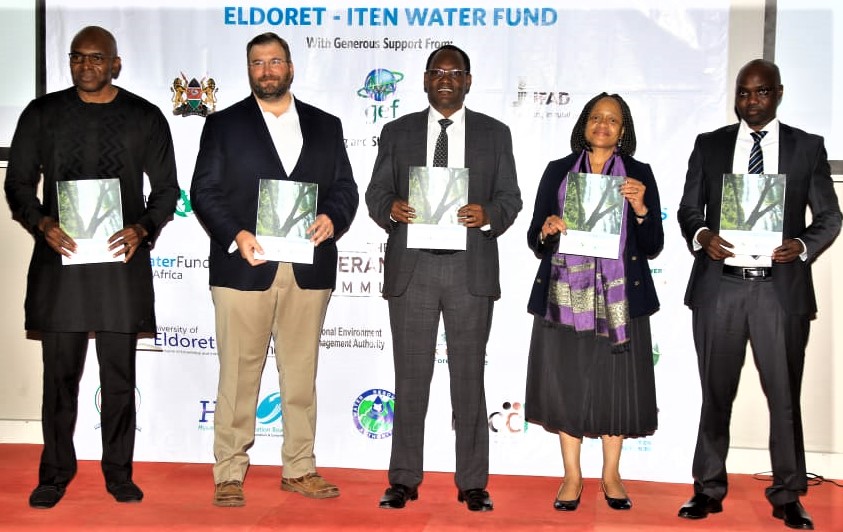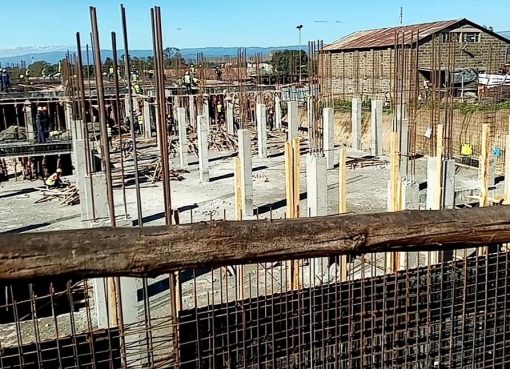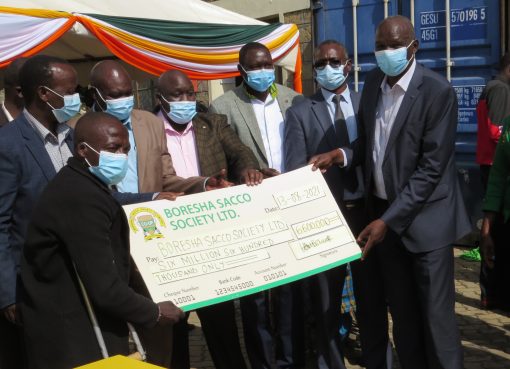Residents of Uasin Gishu and the neighbouring Elgeyo-Marakwet counties are set to benefit from access to clean and quality drinking water through conservation of water sources.
This follows the launch of the Sh320 million Global Environment Facility (GEF) funded Eldoret – Iten Water Fund project that will focus on catchment restoration, especially in areas that water to Iten and Eldoret towns emanated from.
The project, funded through International Fund for Agriculture (IFAD) and The Nature Conservancy, falls under GEF cycle number seven projects funded by the global kitty. The entire cycle has an initial budget of Sh1.9 billion.
Environment and Forestry Principal Secretary Dr. Chris Kiptoo said out of Sh21 billion GEF aid allocation to Kenya this year, Sh3 million towards climate change mitigation, Sh13m will go towards biodiversity while another Sh3 million will go towards land degradation restoration.
Speaking at an Eldoret Hotel during the official launching of the Eldoret – Iten Water Fund, the PS said the project would be implemented for three years adding that apart from conservation, the project also aims at training farmers on good agricultural practices that would not only help them improve productivity but also improve their livelihoods.
Dr. Kiptoo said Kenya has cumulatively received more than Sh120 billion since the first GEF circle to date, this includes more than Sh 900 million of co-financing from other stakeholders.
The PS observed that over the past years, forest cover, especially indigenous forests, has been destroyed by human activities like indiscriminate felling of trees due to increased pressure for additional land for farming.
“This, coupled with poor farming methods and excessive use of agrochemicals, has led to soil erosion in riparian areas leading to water contamination and pollution,” said Dr. Kiptoo.
We are facing a serious crisis currently, namely climate change, pollution control, and biodiversity and nature loss, said Dr. Kiptoo who called on Kenyans to embrace serious environmental conservation and tree growing to mitigate the challenges.
Elgeyo-Marakwet Governor Wesley Rotich thanked the donors saying the project, through the various partners, would be convening public, civic, and private sector entities to restore degraded land, improve management of forests, conserve riparian land, protect biodiversity, and increase stream flow among other interventions.
“They will also be engaged in other alternative livelihood projects like beekeeping and tree cash crops that will raise the economic status of our people,” said the incoming Governor.
“I wish to thank the entire team that was designing the project together with all the partners involved. I am happy to have been part of this great team together with my Deputy Prof. Grace Cheserek,” he added.
Governor Rotich also thanked Kenya Forest Service (KFS) board for allowing farmers to continue growing maize and other crops in parts of forest land as they take care of trees under the plantation establishment and livelihood improvement scheme (PELIS) commonly referred to as ‘Shamba system’ following a persistent appeal by residents of Elgeyo-Marakwet.
North Rift head of conservancy Anthony Musyoka in his remarks said they have completed planting over 4,000 ha of trees in Kaptagat Forest which is one of the critical catchments for water sources serving both counties.
Musyoka said they were working in collaboration with the community to restore degraded land and improve the management of forests covering riparian land in an effort to increase stream flow.
According to Eldoret Water and Sanitation (ELDOWAS) Company Managing Director Peter Biwott, climate change was adversely affecting weather patterns in the region leading to unpredictability in rainfall and prolonged drought which directly affects the availability and quality of water to Eldoret and Iten towns.
“The effects of climate change and degradation of water catchment areas through deforestation and unstainable farming activities among others are being felt due to delayed rainfall earlier experienced in the Cherangany hills and its environs, this has resulted to reduced water levels in Moiben dam and has had an impact on the quality of raw water that Eldoret town relies on,” said the MD.
“Climate change is becoming real. Water levels have gone down, and rains have become less, so the oxygenation of our dam has not been adequate this year. Agricultural work around riparian areas has led to floods full of manure to the dams compromising on our quality of water. We just have to partner and reverse the trends, otherwise in the not-so-long future, water scarcity will reach serious levels,” warned Biwott.
“We need to move with speed to conserve our 177,000 ha catchment area. This will guarantee us a good stay in Eldoret for many more years to come,” he added.
The MD, who was also present during the launch of the Eldoret – Iten water fund project, however said ELDOWAS was engaging in various climate action initiatives including targeting to plant 5 million tree seedlings within the water catchments in the medium term.
“Since May 2022, we have planted 15,000 tree seedlings. The establishment of the Eldoret – Iten water fund will go a long way in targeting rejuvenation of our water catchments through reforestation, livelihoods improvement, water conservation, and sensitization as well as the implementation of climate-smart initiatives,” he added.
By Kiptanui Cherono





